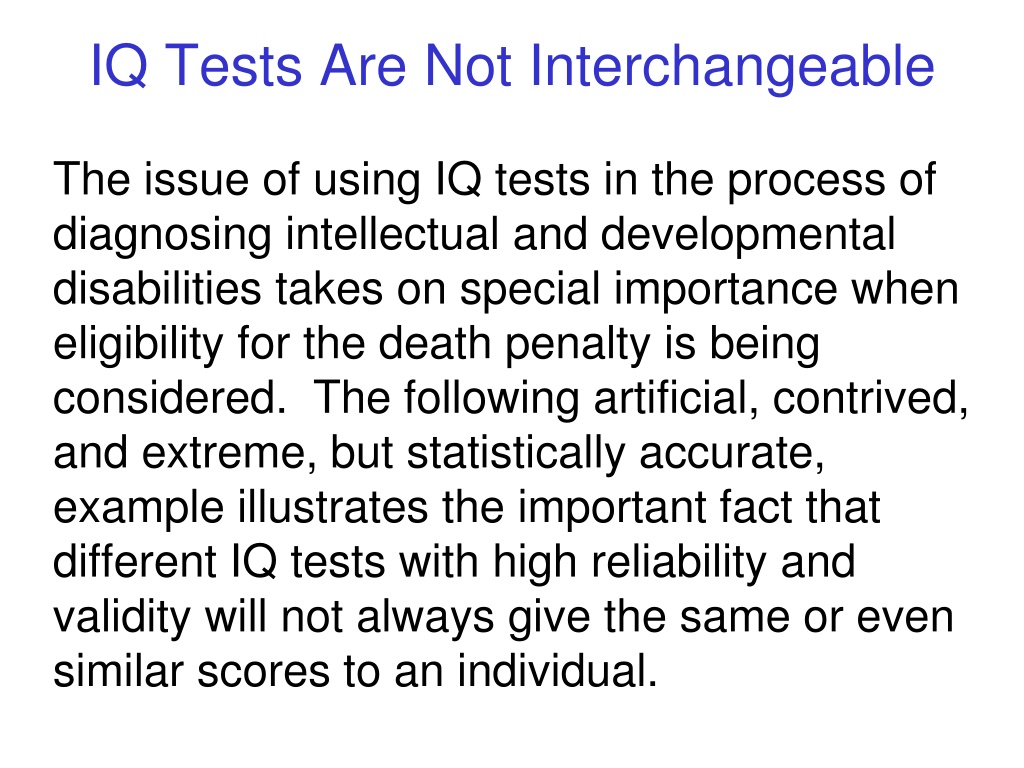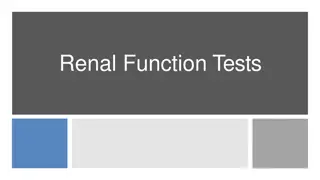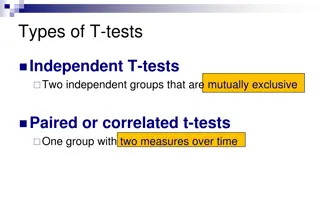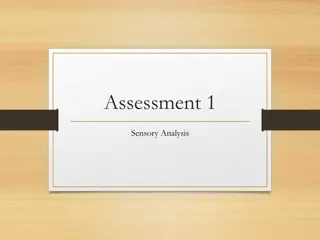Understanding IQ Tests in Legal Context: Importance of Different Measures
The use of IQ tests in legal settings, such as determining eligibility for the death penalty, requires careful consideration due to the unique characteristics of different tests. This scenario involving Sam Adkins highlights how varying cognitive measures can lead to disparate results, emphasizing the need for comprehensive evaluation in such cases.
Download Presentation

Please find below an Image/Link to download the presentation.
The content on the website is provided AS IS for your information and personal use only. It may not be sold, licensed, or shared on other websites without obtaining consent from the author. Download presentation by click this link. If you encounter any issues during the download, it is possible that the publisher has removed the file from their server.
E N D
Presentation Transcript
IQ Tests Are Not Interchangeable The issue of using IQ tests in the process of diagnosing intellectual and developmental disabilities takes on special importance when eligibility for the death penalty is being considered. The following artificial, contrived, and extreme, but statistically accurate, example illustrates the important fact that different IQ tests with high reliability and validity will not always give the same or even similar scores to an individual.
Sam Adkins, age 16, (apocryphal and therefore no relation to Daryl Atkins), has been convicted of murder by a jury of his peers. In order to determine the appropriate sentence (Life Imprisonment or Death), and because of the United States Supreme Court decision in Atkins v. Virginia, the court has requested that Sam s intellectual ability be assessed by experts in the field using the most modern cognitive measures.
A review of Sams educational history suggests that he may have a severe learning disability reflected in extremely low auditory (Ga), short-term and working memory (Gsm), long-term storage and retrieval (Glr), processing speed (Gs), and math abilities (Gq).
In fact, Sam has precisely average (standard score 100) verbal (Gc), spatial (Gv), and fluid reasoning (Gf) abilities. His severe learning disability is reflected in extremely low (standard score 50) auditory (Ga), short-term and working memory (Gsm), long-term storage and retrieval (Glr), processing speed (Gs), and math (Gq) abilities.
(Without those severe and pervasive processing disorders, Sam's Gc, Gv, and especially Gf scores might be considerably higher.) However, given the abilities listed above, the following are Sam's scores on seven cognitive ability measures. Not all tests measure the seven broad abilities we are considering, so there are blanks.
Sam's Total Scores (GIA, FSIQ, GCA, CIX, FCI, or MPC) on Seven Tests Several tests, especially the DAS-II, have additional subtests that are not included in the total score.
Because various intelligence tests measure and omit different abilities, any one individual may receive, as did Sam, very different scores on different tests, even though the tests are highly correlated with each other when applied to large groups.
Such differences can have serious consequences for identification of disabilities under IDEA, for determining eligibility for disability services and support, and for determining eligibility for the death penalty.
Kevin McGrew has been doing extensive work on this issue with regard to death-penalty cases. His data and comments can be found at: http://iqmrdeathpenalty.blogspot. com/2011/08/kevin-mcgrew-apa- flynn-effect-in-atkins.html
From Kevin: "The AAIDD ID and death penalty guide is now available at the AAIDD webpage! Although the title is focused on the death penalty and ID (Atkins cases), having written two of the chapters (Flynn effect; Intellectual functioning), I believe all professionals in the field of psychological, assessment and ID should have this reference book--it presents recommendations for ID practice that go well beyond the official AAIDD classification book (the Green book) and are relevant to ID assessment practices in general."
Polloway, E. (Ed.) (2015). The death penalty and intellectual Disability. Washington, D.C.: American Association on Intellectual and Developmental Disabilities. ISBN 978-1-937604-13-4. Member price: $33.95. Nonmember price: $39.95. https://aaidd.org/publications/bookstore- home/product-listing/the-death-penalty-and- intellectual-disability#.WHkDB_krLIU
"This book is the authoritative resource on the application of diagnostic information concerning intellectual disability (ID) in death penalty cases. In a landmark decision in Atkins v. Virginia in 2002, the Supreme Court ruled that executing someone with ID is a violation of the Eighth Amendment of the U.S. Constitution, which prohibits cruel and unusual punishment. In its 2014 decision, Hall v. Florida, the Court ruled that, while states have the right to establish their own rules for handling Atkins cases, they cannot ignore scientific and medical consensus regarding intelligence and the nature and diagnosis of ID. The Court rejected the use of an IQ test score of 70 as a bright-line cutoff for determining ID and rules that all evidence pertinent to the claim, including adaptive behavior assessments, should be considered.
"This publication provides a comprehensive and cogent resource for the use of the range of professionals involved in the determination process for intellectual disability within the criminal justice system. The following are among the critical topics addressed: foundational considerations, including diagnostic criteria, the definition of ID, the analyses of Atkins cases; assessment considerations; intellectual functioning, including IQ testing and the Flynn effect; adaptive behavior; and related topics, such as cultural and linguistic factors, competence to waive Miranda rights and to stand trial, retrospective diagnosis, malingering, comorbid disorders, educational records, and professional issues."























